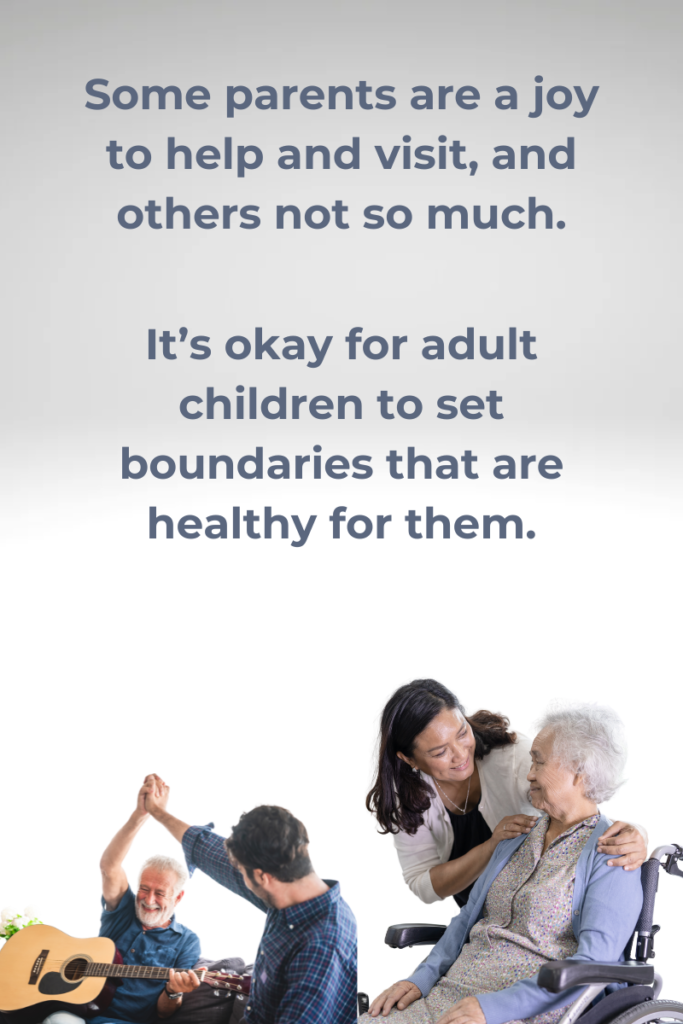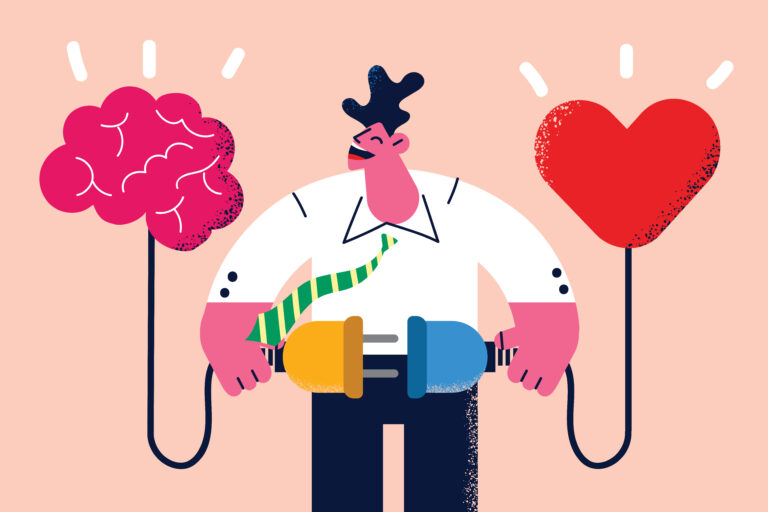How Adult Children Can Set Boundaries With Their Parents
Adult Children Set The Rules for How They Live.

Adult children often ask me to coach them on how to deal with parents who have expectations, manipulate, control, criticize, meddle, offer unsolicited advice, and complain about things they do, say, refuse to do, or don’t want to do. I’m always asked, “Is it okay to be myself and do what I want, or am I obligated to make my parents happy?” I’m glad you asked because I have the answer.
There are so many ways an adult child and parent relationship can go wrong that it’s a wonder anyone gets it right. It is one of the most talked about subjects in my therapy sessions and the hardest thing for older children to change. Most adult children who feel burdened by their parents but are too afraid to attempt setting boundaries would love to tell them off, shut them out, and tell them to take a chill pill. Still, they won’t do it for fear of being seen as bad or ungrateful. I believe my client’s struggle with this is primarily because of a cultural thing that started long ago with the Bible’s commandment that everyone knows, “Honor thy father and their mother.” But what does that mean?
When I searched for this commandment on a Christian website called Christianity.com, I found that Christians believe God commands us to be respectful (Okay, fine), prize highly (Mm, it depends), cared for (Uh, not necessarily), and obey (Hell no). The website said that natural rebellion pushes us against authority as we grow, which I agree with. Still, it adds that all authority structures are to be respected, and to go against authority is to go against God. Oh, dear Lord, no wonder many clients are torn up about this subject.
It’s important to understand that the more rules humans are forced to live by, the more miserable they will be. We were meant to be free, our authentic selves, whatever that is. The more we are asked to conform, the more we agree to do it, the more our mental health will suffer. This is the essence of therapy: helping people find the courage to be themselves and to understand that whatever that is is okay. This may mean setting boundaries with people like your parents, which is perfectly okay. This is why the message on Christianity.com and many other religious websites, as well as certain strict and conservative denominations, teaches us to bow to authority and is basically asking us to suffer. If there is God, and I personally believe there is, I don’t believe they would want that from anyone.
When adult children tell me about the boundary violations their adult parents commit, the good news I often deliver is that it is okay to be yourself, to tell people no, to live life the way you want, to eliminate unhealthy relationships if you have any, and to manage your life like a business, keeping your mental and emotional health in the black, which means being content, and at peace with yourself and your life. This often comes as a shock to people. It’s a little like buying a new car for a teen by surprise, handing them the keys, and they look at you and say, “Really? It’s mine? I can drive this?” Yes, with parents, you don’t have to be a short-order cook for their wants and needs. You get to choose what you want and are willing to do. It is not wrong to do that, but it is wrong for them to push against that.
If our parents knew healthy family dynamics, they would understand that parenting has three phases: 1. Raising your young children, 2. Launching them into independence and adulthood, and 3. Stepping away from parenting them and standing by to love, support, and coach them if needed. Parents of adult children must stop offering unsolicited advice, judgment, and scrutiny or saying things meant to make them feel guilty. An adult child owes their parents nothing, and if they want their children to visit and be in their life, let them live the way they choose without negative commentary. Children aren’t meant to turn into their parents’ bank account, caretaker, or retirement plan, and it should not be expected. If an adult child chooses to do that, great. If not, fine.
People feel guilty about not always being there or not wanting to be there for their parents, but that is only because of their current belief system. Guilt is about going against a belief or value that you currently have. A good example is if I am against stealing and I steal something, I will feel guilty. If I think it is okay to steal, I won’t. If a grown child’s current value or belief is: “Children should do what their parents want,” then yes, they will feel guilty when they don’t do what their parents want. Luckily, many of our beliefs and values are outdated and need to be reexamined, especially the ones that no longer serve us well. A new, healthy, appropriate belief might be, “My parents are adults and can care for themselves. I am willing to help them when I want to, and I can, but I get to decide that and sometimes do it, and sometimes not, on a case-by-case basis. I have the right to choose boundaries for myself that are healthy for me.” Even if your parents can’t care for themselves, you still have the choice about whether or how much you will be involved in their care.
People who harshly judge adult children who don’t bend to their parent’s authority are off base and know nothing about mental and emotional health and appropriate family boundaries. Also, none of us knows how these children were treated when they were young; families are notorious for presenting false facades of positivity to the outside world. If the Bible, or any entity, says we must serve a parent who wasn’t there for us in the way we needed them to be, who perhaps abused, criticized, diminished, beat us, and/or didn’t nurture, guide, and protect us, then something is wrong with the entity that believes that. The sad truth is that many adult parents have no clue how to have and maintain a healthy, good, or great relationship with anyone, and of course, that includes family members and their grown children.
Many people I work with once admired their parents; I know I did. At some point, most of us began to see them through a more realistic lens, could see their mistakes and weaknesses, and were able to take them off the pedestal of perfection they’d been put on. It’s vitally important that if we weren’t treated well as children or if our parents neglected or abused us, it was because of their dysfunction and shortcomings, and not that we weren’t good enough as young people. Children are precious and act wild and impulsively because that is the nature of a child. I know my father couldn’t deal with the chaos and wildness of children and would whip us with his belt when we got on his nerves. This was his way of saying there was something wrong with us when the truth is, there was something wrong with him. Once we see them as the flawed and mistake-making human beings they are, we have a chance for healing. Some clients even report surpassing their parents intellectually, developmentally, and emotionally, much to their surprise, but it happens all the time.
Quite a few parents of adult children have serious mental disorders like narcissism. borderline, or histrionic, untreated depression and anxiety, or addictions that explain their bad behaviour. Most have plenty of childhood trauma that rendered them emotionally immature and have never done a thing about it. It can help to visit a therapist and talk to them about it, as I have talked to hundreds of clients. They will probably be able to explain some of the possible reasons your parents are so impossible, which may offer you some relief, understanding, and confirmation that the problem was never you; it was always their inability to be relational in a healthy way. Some of those issues cannot be repaired, but others can.
If you think your parent might be open to growth, change, and a better relationship, I encourage you to try family counseling, where difficult conversations can be made easier. I have had clients come in with their parents and seen some who are eager to adjust and make it right, and I have seen others so narcissistic that if their child didn’t fall into line, they were prepared to disappear from their lives.
I’m thinking of one in particular whose adult daughter, an only child I’ll call Mitsy, was at the tail end of a horrific divorce from a narcissist who had cheated and lied and who was already living with his affair partner. They had three young children. My client was in her 40s and had met someone she wanted to date, and her mother strongly disapproved, saying, “I don’t want you to date until your divorce is final. If you do, it will embarrass me.” I told my client that her mother was being unreasonable, so she brought her in. We talked, she explained her point of view, and I told her about healthy boundaries with adult children.
“I don’t care about what you say is healthy,” she says. “My daughter is embarrassing me, and if she doesn’t do what I say, I will move home (back to her home state hundreds of miles away); she’ll not have me to help with her children, and things will never be the same.” Nothing I said softened her position.
After she left, I thought, “Man, she’s out of control with being in control.” It was difficult to comprehend, but the mother had been this way throughout my client’s life.
Mitsy had never had therapy before she came in for marriage therapy, and after her marriage crumbled, she continued coming on her own. She was a quick learner in her quest to be healthy as an adult woman and began setting boundaries and being true to herself. Formerly a pleaser, she decided she would no longer cower to anyone’s demands, which was a tremendous first step. When you set a boundary with a narcissist, they will almost always go scorched earth against you, protest, and accuse you of being the villain, and that’s what her mother did. Her mother moved and died a couple of years later from COVID. My client had no regrets.
Narcissistic parents of adult children present with a perspective and sense of entitlement that adult children are treated, controlled, and parented, much like like small children, when the truth is if you do that, you may lose your adult kids and any chance of a relationship with them.
Ever wonder why some children intentionally move far away from their extended family? I can’t tell you how many clients I’ve had who have already cut off or come thisclose to becoming estranged from at least one parent, and deservedly so. Too many clients I’ve seen keep huge parts of their lives hidden from their parents for fear of their harsh judgment and repercussions. What a terribly sad and unhealthy way to live, but they understand their parent’s love and acceptance is conditional on certain things being true. So many young adults love their lives and how they live, and they also love their parents and don’t want to lose them, so they feel compelled to live double lives. It’s tragic.
Great parents allow space for their own children to grow into who they are and fully accept whatever that is, even if they don’t like it. I’m not talking about children who are addicted to dangerous substances, of course, but children whose lifestyles, interests, and beliefs are not in line with theirs. My own daughter, who is 34, and I could not be more different, and never once have I tried to control or judge any part of who she is. Seeing her as my teacher and learning to love, adore, and consider her a best friend with all our differences has made me a better person. This is the challenge for parents with children who live different lifestyles than we had imagined. To turn your back on a child is the last thing any parent should do, and only occur in rare cases of an adult child shamelessly disregarding or violating you or your property in harmful ways. In most cases, the onus is on the parents to ensure the relationship with their adult children stays healthy and not the other way around.
If you are reading this and wondering if it’s time to stand up and set healthy boundaries with your parents, understand that the first time you do, it may cause you to feel like the sky will fall. I assure you it will not. You may hear snide remarks, and your parents may play the victim, but in my experience, most have been fairly reasonable and accepting, much to my client’s surprise. Telling your parents how you really feel, what you want and need when it comes to them is a good thing. Don’t be afraid of them; you’re an adult now, and the bottom line is you have the right to live your life your way.
I want to mention another issue regarding adult children and their parents: the fear of losing their inheritance. I have seen many older adults end up losing everything they have saved at the end of their lives. Some of my family members have lost everything, including my parents, and my clients have told me tales of their parents gambling their money away, being swindled, losing their family home due to reverse mortgage deals, or other debacles. This is why I tell my clients who fear being disinherited to live their lives as if they will never inherit anything. Be true to yourself no matter what, and tell yourself that you need to be sure you are self-supporting and okay financially,
No matter what occurs. If you are selling yourself out or not setting healthy boundaries because of fear of losing financial support or property, then maybe it’s time to ask yourself what is really important and why you would make such a choice. I also believe that parents who use inheritance as leverage to control their adult children are shameless and cruel.
Family relationships are difficult on the best of days, but you have the right to be yourself. Don’t let anyone, including your family, tell you otherwise. If you have children, stop trying to get them to conform to whatever ways you think a person should live. If – want them to visit when they grow up, be fair and reasonable now and allow them to be themselves, or at least give them the space and encouragement to try and figure out who that is. Older kids will probably push back at some point, which is normal. Having ground rules to keep them safe, always being fair, and making yourself available to discuss things without judgment or criticism are important. You can make certain the generational dysfunction stops with you.
- Have a question? If you have a subject you’d like to see me write about or a situation you might want to present that I could discuss in a blog, please email me at [email protected].
- We’ve got lots of news and exciting things going on in the relationship realm … so I’m preparing to send a regular newsletter with the best relationship advice on the planet. To get on my email list, click here.
- Becky Whetstone, Ph.D., is a licensed Marriage and Family Therapist in Arkansas and Texas* and is known as America’s Marriage Crisis Manager®. She is a former features writer and columnist for the San Antonio Express-News and has worked with thousands of couples to save their marriages. She can work with you, too, as a life coach if you’re not in Texas or Arkansas. She is also co-host of the YouTube Call Your Mother Relationship Show and has a telehealth private practice as a therapist and life coach via Zoom. To contact her, check out www.DoctorBecky.com and www.MarriageCrisisManager.com. Also, here is how to find her work on the Huffington Post. Don’t forget to follow her on Medium so you don’t miss a thing!
- For licensure verification, find Becky Whetstone Cheairs.
If you enjoyed this, you might also enjoy these:
https://medium.com/@doctorbecky/setting-boundaries-is-the-ultimate-healthy-self-care-c42bc4312f97
https://medium.com/@doctorbecky/three-priorities-that-create-happy-successful-families-cf3f9dc47999
https://medium.com/@doctorbecky/a-guide-to-healthy-self-esteem-and-setting-boundaries-c5f066ef0b42





